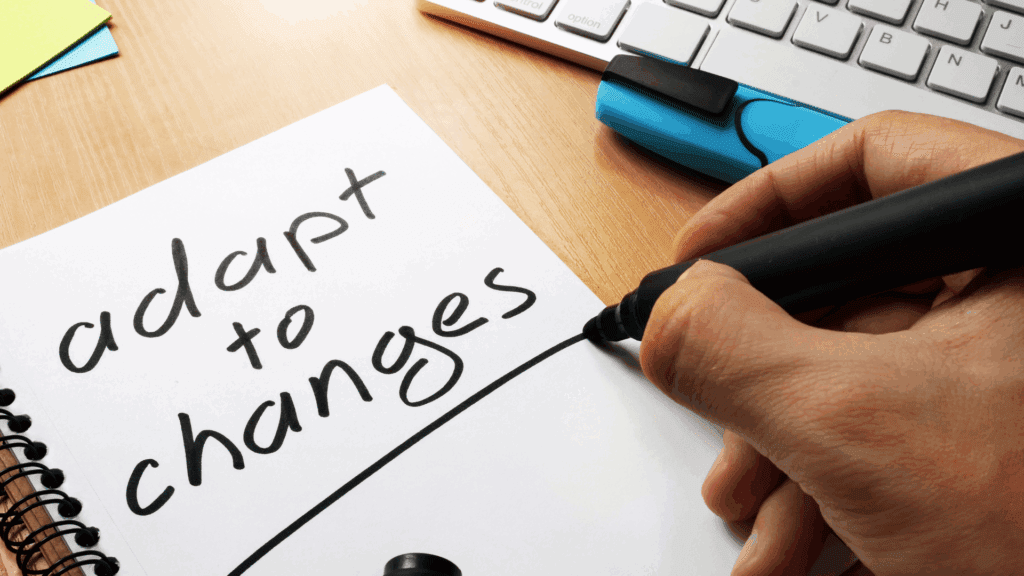In my years of experience as a brain-based doctor and life coach, I’ve seen the transformative power of adaptability firsthand. Life coaching techniques for coping with change, personal resilience, adaptability strategies, mental well-being, and change management coaching rely on this quality.
What is Adaptability?
The ability to adapt to change is encapsulated in a single word: adaptability. It’s an invaluable skill that is as useful in our personal lives as in the business world. In fact, adaptability is often a sought-after trait in job candidates and is universally acknowledged as a positive attribute.
However, only some find adaptability one of their most vital skills, which is perfectly okay! Some people thrive in stable environments and don’t necessarily crave the novelty of new situations every day. Indeed, matching the right people to the right job is a perpetual challenge.
But there’s no denying adaptability is the key to success in frequently evolving environments. Some enjoy testing their abilities to cope with new tasks and actively seek them out. In contrast, others may have adaptability thrust upon them due to their unpredictable living conditions.
The Importance of Adapting to Change
As I guide my clients through my proprietary life coaching techniques for coping with change, the importance of adaptability becomes apparent. Life is a journey filled with expected and unexpected transitions, and adapting to these changes is crucial for our mental well-being and overall satisfaction in life.
If we adapt to change, we can avoid feeling stuck, overwhelmed, and anxious. Our mental well-being can suffer, and we may struggle with decision-making and maintaining healthy relationships. That’s where personal resilience and adaptability strategies come into play. By developing resilience, we learn to bounce back from adversity and navigate life’s changes with a sense of control and optimism.
How Adaptability Influences Personal Resilience
Personal resilience is our ability to recover from setbacks, adapt to change, and overcome adversity. In my practice, I often explain to clients that adaptability is critical to personal resilience. We can change our approach or expectations in response to new circumstances. In that case, we are better equipped to bounce back from life’s challenges.
In brain-based coaching, we look at how neuroplasticity can support resilience. When faced with changes, our brains can forge new connections and pathways to help us adapt. It’s a continuous, dynamic process that allows us to learn from experiences and grow stronger.
Brain-Based Coaching and the Science of Adaptability
Through my experience in neuroscience and brain-based coaching, I’ve discovered that our ability to adapt to change is deeply rooted in our brain’s capacity for neuroplasticity – its ability to rewire and create new neural pathways in response to our experiences. This fantastic feature of our brains means we can train ourselves to become more adaptable, regardless of our current skill level.
As a life coach, I apply this neuroscience knowledge to help my clients develop mental well-being and change management coaching strategies. Understanding how our brains process and adapt to change can create more effective coping strategies and boost personal resilience.
Enhancing Mental Well-being Through Change Management Coaching
Change can be daunting, but it’s also an opportunity for personal growth and improved mental well-being. As a life coach, I focus on change management coaching strategies that promote mental well-being by helping clients navigate transitions effectively.
Effective change management involves:
- Recognizing the emotional impact of change.
- Fostering a positive attitude.
- Developing a plan to manage the transition.
By employing these, we can minimize the stress and anxiety associated with change and view it as a chance for personal and professional development.

Life Coaching Techniques for Coping with Change
Here are a few life coaching techniques that I utilize to help my clients cope with change:
- Reframe your perspective: By changing how we view change, we can approach it with more positivity and less fear.
- Develop a growth mindset: This mindset encourages us to view challenges as opportunities for growth rather than threats.
- Practice self-care: Regular physical activity, a balanced diet, and adequate rest can help us maintain our mental well-being during periods of change.
- Utilize stress management techniques: These can range from deep breathing exercises to journaling, which can help manage feelings of anxiety and stress associated with change.
Dr. Sydney Ceruto|Founder MindLAB NeuroscienceAdaptability doesn’t come naturally to everyone, but that’s okay. Through my life coaching techniques for coping with change, personal resilience and adaptability strategies, and mental well-being and change management coaching, I will teach you to navigate life’s transitions gracefully and with strength.
Conclusion: Embracing the Journey of Change
Ultimately, life is about evolution and growth. Changes, both big and small, are inevitable. How we adapt to these changes can significantly influence our quality of life, mental well-being, and personal and professional success. Through life coaching techniques for coping with change, emotional resilience and adaptability strategies, and mental well-being and change management coaching, we can harness and use the power of adaptation to our advantage.
Suppose you are ready to unlock your adaptability and discover how to thrive amidst change. In that case, I welcome you to embark on this transformational journey with me.Please schedule a 1Hr Elite Insight Strategy Call with me, Dr. Sydney Ceruto, at MindLAB Neuroscience today. Let’s turn change into an opportunity for growth and discovery together.
, , , , , , ,













